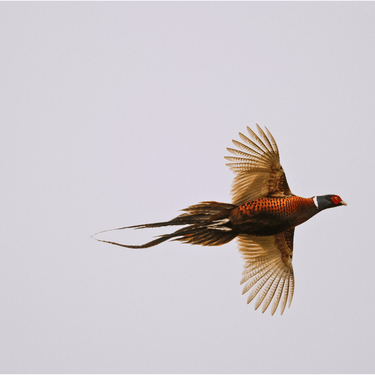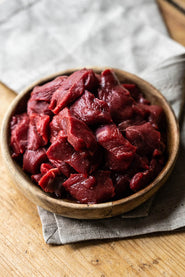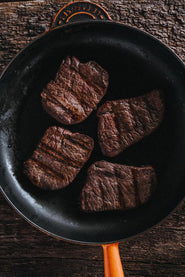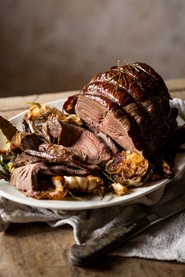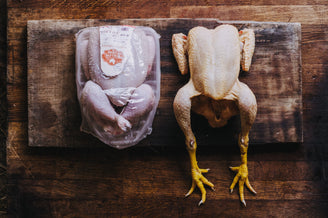The preservation of game is entwined with the history of our country. As a vital food source, over the decades its value has influenced the way we manage the countryside.
All meat used to be ‘game’, it wasn’t until early medieval times when we began farming animals, that there became a distinction between wild meat and farmed meat.
The success of our ability to domesticate animals has meant that wild meat or ‘game’ is now eaten less frequently now, than by our ancestors.
Many consumers are only comfortable eating meat that has been controlled by the hand of man, that has been sanitised and is often so far removed from its wild form. Bizarrely, we have a culture where the more we intervene in nature, the greater the trust there is in consuming that food. Our belief is the total opposite, the less meat has been interfered with by man, the better.
Over the last 50-100 years farmed meat has seen increasing popularity across the globe as diets have changed, this has lead to further and further industrialisation of farmed livestock to keep up with rapid demand. Most of the meat that is purchased today comes from intensive systems, where welfare, flavour and tradition are non-existent.
You’ll often hear in the news the need for protein to increase, to sustain a growing population, this statement has lead to the justification of the amazon rainforest being cut down to produce grain for ruminants and has also contributed to the rise of equally unsustainable vegan alternatives, produced in monocrop systems, often sprayed with cancer-causing chemicals that make their way into our waters.
If it is true that we need to find ways of sustainably harnessing more protein for growing populations, why is wild game not part of the discussion?
In its name lies the answer, you’re unlikely to find profit-hungry corporations telling us to eat more wild meat, as it cannot be monetised and monopolised. Therefore game has never had the PR power fake meat and ‘cheap’ chicken, for example, has.
Why is it for even the most passionate carnivore, game often rarely features on the table, when there are so many reasons why game should be celebrated?
There is no getting away from the fact that we as a nation were built on wild food. Game is a huge part of our cultural heritage and is central to many of our festivals and the way we map out seasons in the countryside. Eating game in season, represents a compassionate and intelligent way of eating often lacking in our frenetic lives today. It is a way to embrace our history and reduce our impact on our environment.
There is an old adage ‘you are what you eat’, this rings true in the case of game. Having lived a thoroughly wild existence, game meat is often permeated with all sorts of herby, rich and sweet flavours plucked from nature where game animals have been foraging. Eating game can also be a wonderful discovery of flavours and textures that can be paired harmoniously with other delicious seasonal wild foods, from wild mushrooms to hedgerow fruits. A nod to another old adage ‘what grows together, goes together’.
Game is both low in fat and high in protein, there are also benefits of higher Omega 3 levels in animals that have eaten a diet rich in forage and pasture.
Cooking game can help teach you new skills and influence the way you look at other food. Understanding how to pluck, eviscerate and portion game meat will also help you to build confidence in the kitchen with other more traditional cuts of meat too, as they mostly are built the same way. For example, a rabbit is built the same way as a lamb or beef carcass, just on a much smaller scale. It goes without saying a pigeon is made up of the same muscles as a chicken or duck.
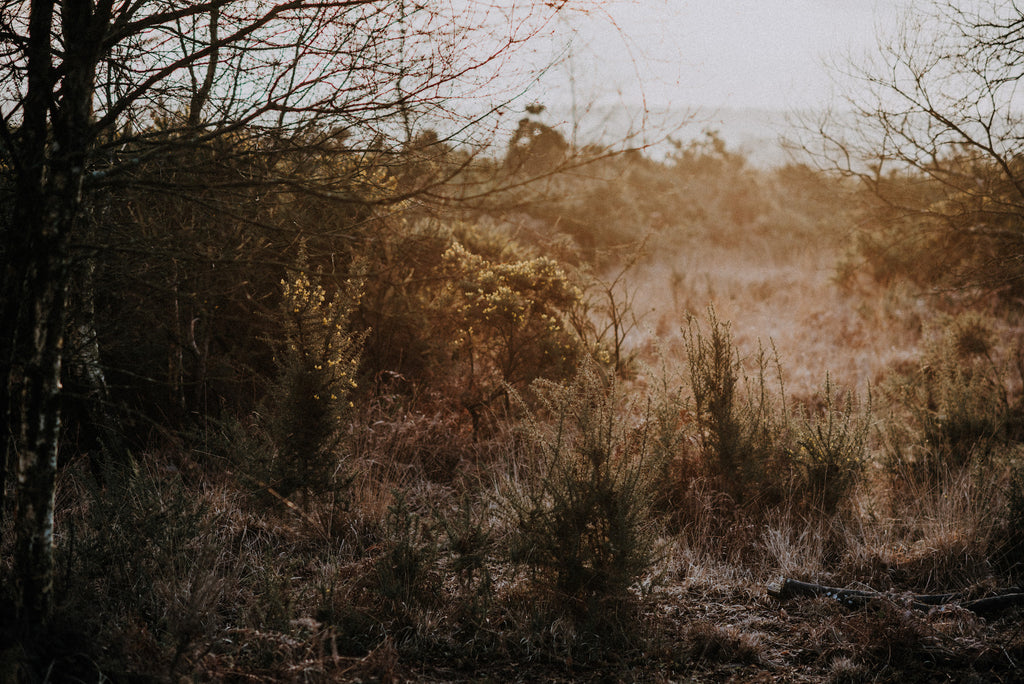
The Sustainability of Game
It could be argued that game is some of the most sustainable meat available, living in a state of freedom that many farm animals can never achieve. It is taken quickly from nature, often for conservation reasons to keep the colony strong and healthy, and to avoid the dominance of one species that can create an unharmonious ecosystem. When it comes to death, game is often despatched in a split second from a natural existence, it is about the best and most humane way to do it.
Urban dominated society has forgotten that some of the finest food flies, runs or swims free, as it has done since the dawn of time. We have detached ourselves from animals, this divorce fosters our ability to reconcile factory farming. By disconnecting ourselves with our food source we can behave in an ‘out of sight, out of mind’ regard to what we eat. We all know the horrors of how, especially, chicken and pork are produced today, yet how many of us totally exclude this type of meat from our diet? By the time the meat has been processed, sanitised and packaged we have tricked our mind into ignoring the horrors that have befallen this beast. If a brace of rabbits in the fur were to be plonked on the same kitchen table, you can easily imagine screams of horror at seeing a ‘bunny’ sprawled out ready to serve for dinner. I don’t know about you, but I’m certain of which one makes me recoil in horror. The mind has an incredible ability to trick us into making irrational decisions through detachment of where our food has come from.
Confronting how your food has come to the table builds deeper regard for the animal and encourages us to value it more and waste less of it.
Seeing food unprocessed in its natural form should be celebrated and help us draw a closer connection to nature.
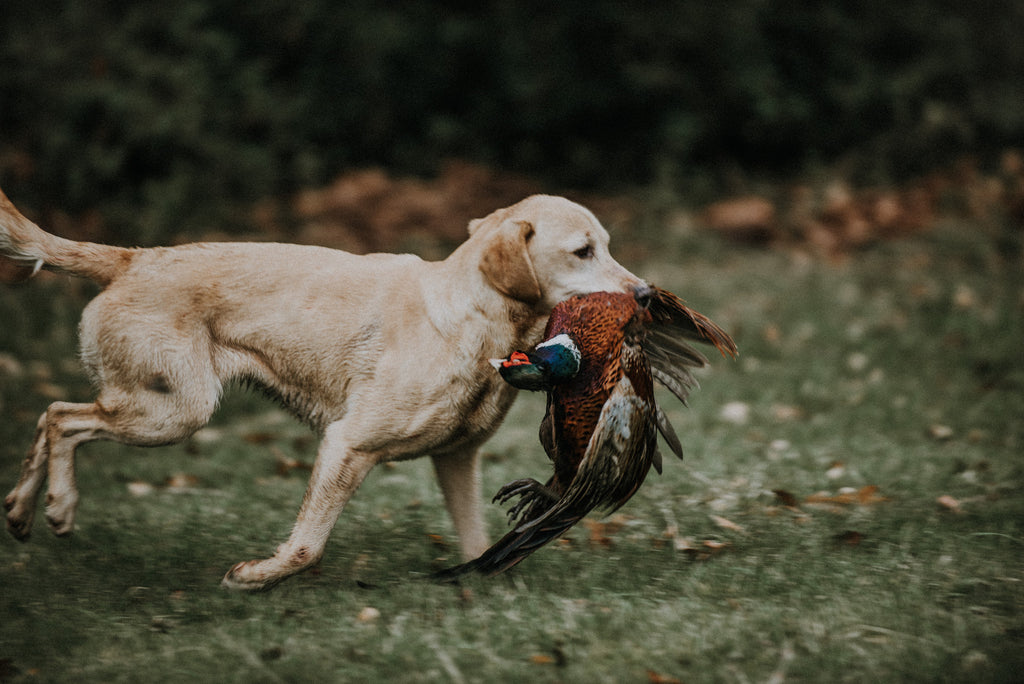
The Ethics of Hunting
As with any meat, game does not come without its thorny issues. The notion of hunting as ‘sport’ is difficult for some. The word sport has been used for centuries to describe hunting and shooting game as it recognises that pursing game is a test of skill. In the days of Henry VIII it was not uncommon for the monarch to pursue game on horseback for hours on end, and make camp for weeks in order to bring home a beast. It was the young King’s main form of exercise as quoted for both his ‘body and mind’. Once he was too infirm to take his exercise and had to give up his sport, his attention instead turned to the beheading of his wives!
Today there is often a bullish and barbaric portrayal of hunting wild food. Hunting is often associated with the upper and middle classes. In the early 90’s when the Labour and Tory divide was at its most fractious, the hunting ban caused a huge divide between groups determined to be either ‘liberal’ or ‘elitist’, this resulted in the uprising and aggression of the ‘toffs’ and their opposition the ‘anti’s’. While not wanting to get drawn into politics, it is fair to say that most of those who hunted at that time, were mostly not the elite and instead many were working class, often farmers and farmworkers, who abided by age-old traditions to manage land and used hunting often as a social engagement. However, for a multitude of reasons, many completely correct, and some stemming from our tendency to anthropomorphise wild animals and misunderstand how to manage an ecosystem, many forms of country pursuits were banned and thus reshaped our relationship once again with wild food.
Hunting has been impacted by those wanting to adopt country sports, without understanding the tradition, vital conservation and societal facets of the catching and shooting of our own food, sadly giving 'hunting' an awful image.
With an increase in wealth around shooting, so has come other controversy. With birds such as pheasants bred in vast numbers, fed a high-growth stimulating diet (including masses of soy and antibiotics), in various levels of captivity before being released into the wild. It could be argued that this isn't really wild food, or a true representation of hunting.
Whilst bringing in questionable cash to the rural economy, it has not done any favours to the PR of wild meat and is often most people's only judgment of what game shooting is all about. There are strong ethical opinions of today's pheasant and partridge industry.
This is not the case of all shoots, there are still some pheasant and partridge shoots where every effort is made for birds to be shot cleanly and almost always picked up and used.
Gamekeepers are a vital part of conserving our countryside, working closely managing heath and moorland bringing a depth of knowledge from working with the land and understanding the careful natural balance better than most.
We have made a choice not to sell Pheasant, Partridge or Grouse, as unfortunately there are far too many grey areas of ethics when it comes to hanging a brace in the larder for our customers and our business has always been built on our ability to provide you, our customers, with complete confidence in the food you are eating.
But oh how I long for the days of my childhood where a neighbour would bring around properly wild birds in the feather and hang them on the door of our house. It really is not that long ago that this sport has changed so dramatically, it is unfortunately now rare not to find intensification of the holy game trilogy of; pheasant, partridge and grouse. If you are lucky enough to live in a community where a neighbour picks off a few properly wild birds, then do enjoy them. They are fabulous food. My hope is that one day the rural economy will not have to rely so heavily on unsustainable sport shooting and instead land could be repurposed once again for communities to produce nourishing food with farmers getting paid a fair price for their efforts, and game can be shot in balance with other species once again.
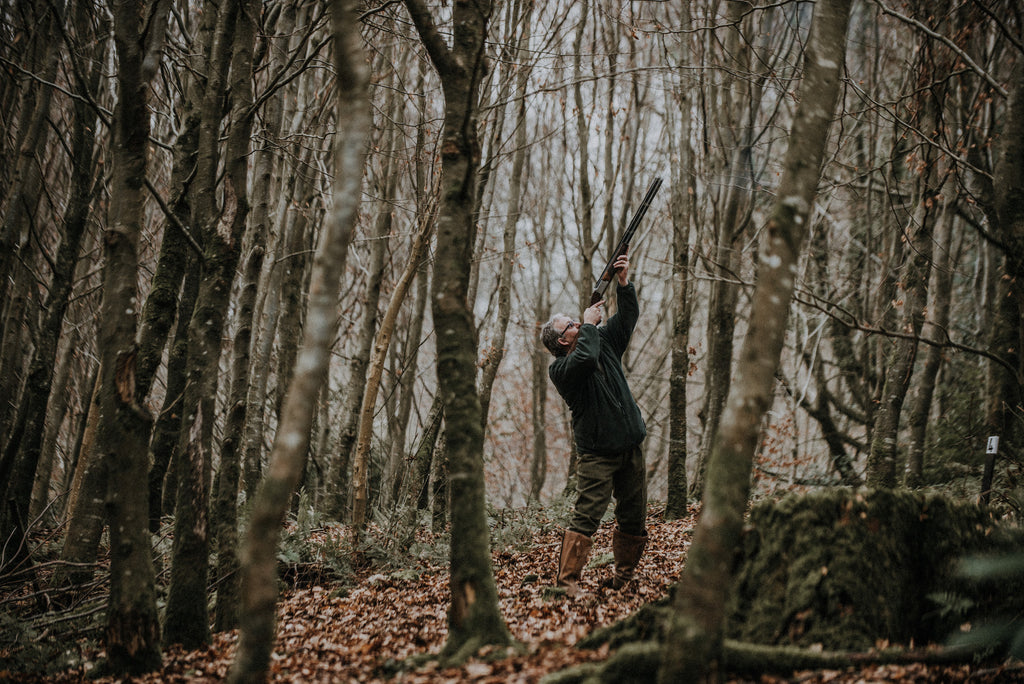
Truly Wild Game
Game meat isn’t all about the trilogy of birds discussed, it also includes species that are shot as ‘pests’ rather than for sport, rabbits and pigeons for example. Now I know the word ‘pests’ is hardly getting your mouth watering, however it is important to understand how this meat does differ from its mass-produced cousins.
When it comes to conservation game the first consideration is, we must not take so many animals that we cause irreparable damage to that species or others that are living symbiotically. Hunting should be done in a way that encourages a harmonious balance of the ecosystem. For example, there can sometimes be a boom in populations of rabbits if the winter weather is mild and wet. This gives an abundance of food for the herbivorous rabbit and can create a problem for farmers with a young crop.
Not eating these animals is simply wasteful. If we reduce our farmed meat intake you could argue that over time less will be reared and slaughtered, however by not eating abundant wild animals whose populations have to be controlled to conserve and promote other declining species, they will simply be wasted, often buried or incinerated. We might as well enjoy this meat.
Eating meat from creatures that have lived a wild existence can be such a joy. I hope that this encourages you to discover or rediscover the beauty and tradition of game.
